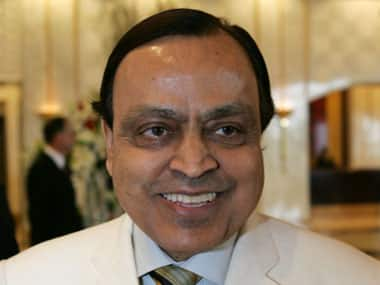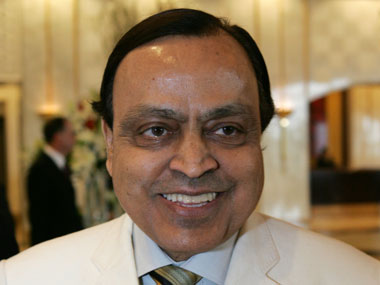The exit of Murli Deora as Corporate Affairs Minister just days ahead of a Cabinet shuffle begs this question: did he go or was he pushed? The chances are the latter. The Indian Express, which broke the story a few hours ahead of Deora’s own terse announcement saying that he was quitting to “offer my services for the Congress party”, hinted that his exit was linked to his seeking a berth for his son Milind Deora. That remains to be seen, but there’s little doubt that Deora’s five years as Petroleum Minister and, more recently, as Corporate Affairs Minister were eminently forgettable. During his tenure, he has seen the financial decimation of the public sector oil marketing companies – something, he, as minister in charge of policy, could have helped avoid. Not only that. At a time when there is growing revulsion against crony capitalism at the Centre, where businessmen, in cahoots with ministers, take the public for a ride, Deora was a public relations liability for the Congress. [caption id=“attachment_36601” align=“alignleft” width=“380” caption=“Union Petroleum Minister Murli Deora. Reuters”]
 [/caption] But easing Deora out serves as a double-message: apart from the message the party is sending to the public, it is also telling its coalition partners that they should be doing the same to their controversial ministers, among them, Dayanidhi Maran of the DMK, who is neck-deep in trouble over favouring a Malaysian company, and Praful Patel, who landed Air India in a mess. In the Congress scheme of things, shifting comes before shafting. Murli Deora was shifted in January, and so was Praful Patel. Patel, though, lives a charmed life because he belongs to another party, the Nationalist Congress Party of Sharad Pawar. Widely seen as being close to the Ambanis, Deora presided over a bankrupt oil policy that involved subsidising the consumer at the cost of the exchequer and the oil marketing companies. Not only that, this policy had the net effect of benefiting only one company (Reliance Industries) though that may not have been the specific intent. How? When petroleum goods are subsidised, it pushes oil marketing companies into losses. But Reliance, as a private player, is not covered by the same price controls. It can thus stop selling in India and export its products to wherever it can make money. Result: only Reliance generates enough cash to invest in expansion. The public sector oil companies are living hand-to-mouth and can’t finance expansion. Deora also jumped in rather late into the Ambani war. When Anil and Mukesh were squabbling over whether or not Reliance will supply Krishna-Godavari gas to Anil at the low price of $ 2.34 million metric British thermal units (mmBtu), at one stage the Bombay High Court ruled in the younger brother’s favour. Deora had stayed out till then, but once the decision went against Mukesh Ambani, Deora suddenly brought the Union government into the picture. He said gas was a national asset and its price could not be privately decided by two brothers. This gesture was widely seen as an intervention in favour of Mukesh Ambani, who did not want to give the gas to Anil. The Supreme Court, of course, ruled in the government’s favour, but the question then was: if gas was a national asset, what stopped the government from intervening earlier? But now the position has changed. With international gas prices significantly higher than domestic prices, Ambani does not want to sell the gas at government-controlled prices. The drop in the Krishna-Godavari offshore gas output over the last couple of quarters is seen as Mukesh Ambani’s
bid to pressure the government
to either raise prices or end controls. During his stewardship of the Petroleum Ministry, when the Ambani war was rising to a crescendo, Anil Ambani accused his brother of “gold-plating” his Krishna-Godavari investments in order to deny government its share of profits. (Under the production sharing contracts signed with oil and gas producers, the government gets its share of profits only after all costs are recovered. Hence showing higher investment helps reduce the payouts to government.) Though Deora asked the Comptroller and Auditor General (CAG) in 2007 to audit the exploration spending in the KG basin, the draft report of the CAG only
confirmed the gold-plating
. In its preliminary report, CAG has accused the Directorate General of Hydrocarbon (DGH), the petroleum industry regulator, of showing undue favours to Reliance Industries by allowing it to jack up its investments without even preparing a comprehensive development plan for the gasfield. According to CAG, Reliance revised the KG basin development cost almost four-fold between 2004 and 2006 from $2.4 billion to $8.8 billion, “without the company offering a single comprehensive development plan as required under the contract”. This gave the company “undue benefit”, but CAG did not quantify this benefit. V K Sibal, the DGH who served under Deora, is now being probed by the Central Bureau of Investigation for showing favours to some firms. While Sibal retired from the DGH in 2009, the regulator began getting tough with Reliance only after Deora was moved from the Petroleum Ministry last January when it
pulled up
Reliance for the drop in KG output. Deora’s shift from the Petroleum Ministry was the first indication that the party high command was not entirely comfortable with him in that role. His exit now confirms the story. For a party that is anyway very compromised by several scams and accusations of inaction, the last thing it needs is a superannuated minister with close corporate linkages.
[/caption] But easing Deora out serves as a double-message: apart from the message the party is sending to the public, it is also telling its coalition partners that they should be doing the same to their controversial ministers, among them, Dayanidhi Maran of the DMK, who is neck-deep in trouble over favouring a Malaysian company, and Praful Patel, who landed Air India in a mess. In the Congress scheme of things, shifting comes before shafting. Murli Deora was shifted in January, and so was Praful Patel. Patel, though, lives a charmed life because he belongs to another party, the Nationalist Congress Party of Sharad Pawar. Widely seen as being close to the Ambanis, Deora presided over a bankrupt oil policy that involved subsidising the consumer at the cost of the exchequer and the oil marketing companies. Not only that, this policy had the net effect of benefiting only one company (Reliance Industries) though that may not have been the specific intent. How? When petroleum goods are subsidised, it pushes oil marketing companies into losses. But Reliance, as a private player, is not covered by the same price controls. It can thus stop selling in India and export its products to wherever it can make money. Result: only Reliance generates enough cash to invest in expansion. The public sector oil companies are living hand-to-mouth and can’t finance expansion. Deora also jumped in rather late into the Ambani war. When Anil and Mukesh were squabbling over whether or not Reliance will supply Krishna-Godavari gas to Anil at the low price of $ 2.34 million metric British thermal units (mmBtu), at one stage the Bombay High Court ruled in the younger brother’s favour. Deora had stayed out till then, but once the decision went against Mukesh Ambani, Deora suddenly brought the Union government into the picture. He said gas was a national asset and its price could not be privately decided by two brothers. This gesture was widely seen as an intervention in favour of Mukesh Ambani, who did not want to give the gas to Anil. The Supreme Court, of course, ruled in the government’s favour, but the question then was: if gas was a national asset, what stopped the government from intervening earlier? But now the position has changed. With international gas prices significantly higher than domestic prices, Ambani does not want to sell the gas at government-controlled prices. The drop in the Krishna-Godavari offshore gas output over the last couple of quarters is seen as Mukesh Ambani’s
bid to pressure the government
to either raise prices or end controls. During his stewardship of the Petroleum Ministry, when the Ambani war was rising to a crescendo, Anil Ambani accused his brother of “gold-plating” his Krishna-Godavari investments in order to deny government its share of profits. (Under the production sharing contracts signed with oil and gas producers, the government gets its share of profits only after all costs are recovered. Hence showing higher investment helps reduce the payouts to government.) Though Deora asked the Comptroller and Auditor General (CAG) in 2007 to audit the exploration spending in the KG basin, the draft report of the CAG only
confirmed the gold-plating
. In its preliminary report, CAG has accused the Directorate General of Hydrocarbon (DGH), the petroleum industry regulator, of showing undue favours to Reliance Industries by allowing it to jack up its investments without even preparing a comprehensive development plan for the gasfield. According to CAG, Reliance revised the KG basin development cost almost four-fold between 2004 and 2006 from $2.4 billion to $8.8 billion, “without the company offering a single comprehensive development plan as required under the contract”. This gave the company “undue benefit”, but CAG did not quantify this benefit. V K Sibal, the DGH who served under Deora, is now being probed by the Central Bureau of Investigation for showing favours to some firms. While Sibal retired from the DGH in 2009, the regulator began getting tough with Reliance only after Deora was moved from the Petroleum Ministry last January when it
pulled up
Reliance for the drop in KG output. Deora’s shift from the Petroleum Ministry was the first indication that the party high command was not entirely comfortable with him in that role. His exit now confirms the story. For a party that is anyway very compromised by several scams and accusations of inaction, the last thing it needs is a superannuated minister with close corporate linkages.
Why Murli Deora may have outlived his utility to Cong
R Jagannathan
• July 5, 2011, 13:10:20 IST
The exit of Murli Deora from the Union Cabinet suggests that the Congress High Command wants to repair some of the damage caused by having too many ministers with corporate linkages
Advertisement
)